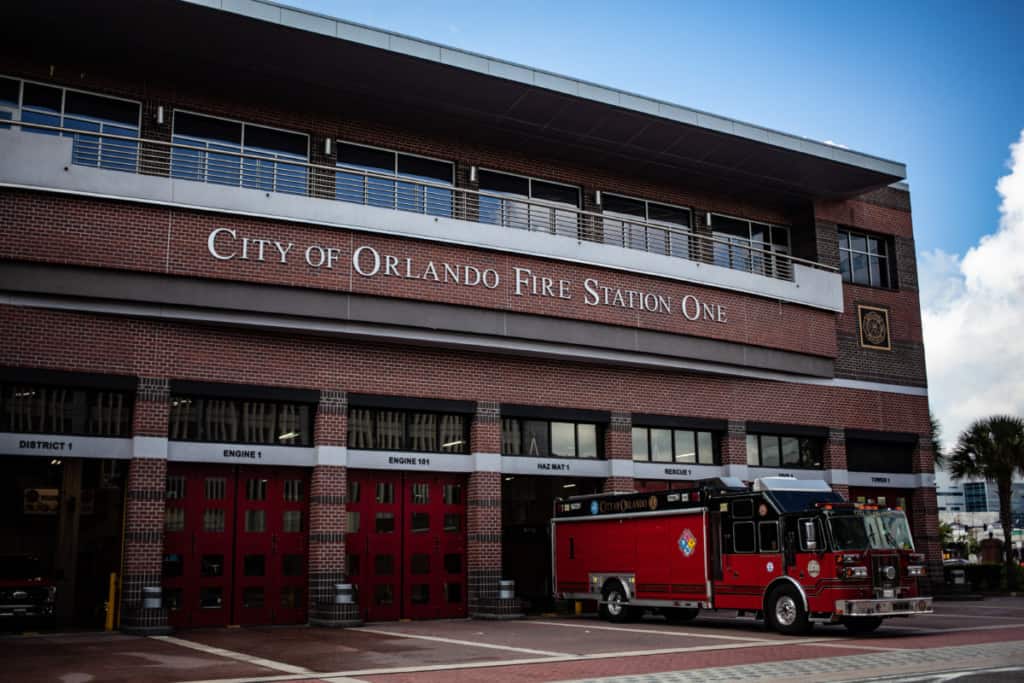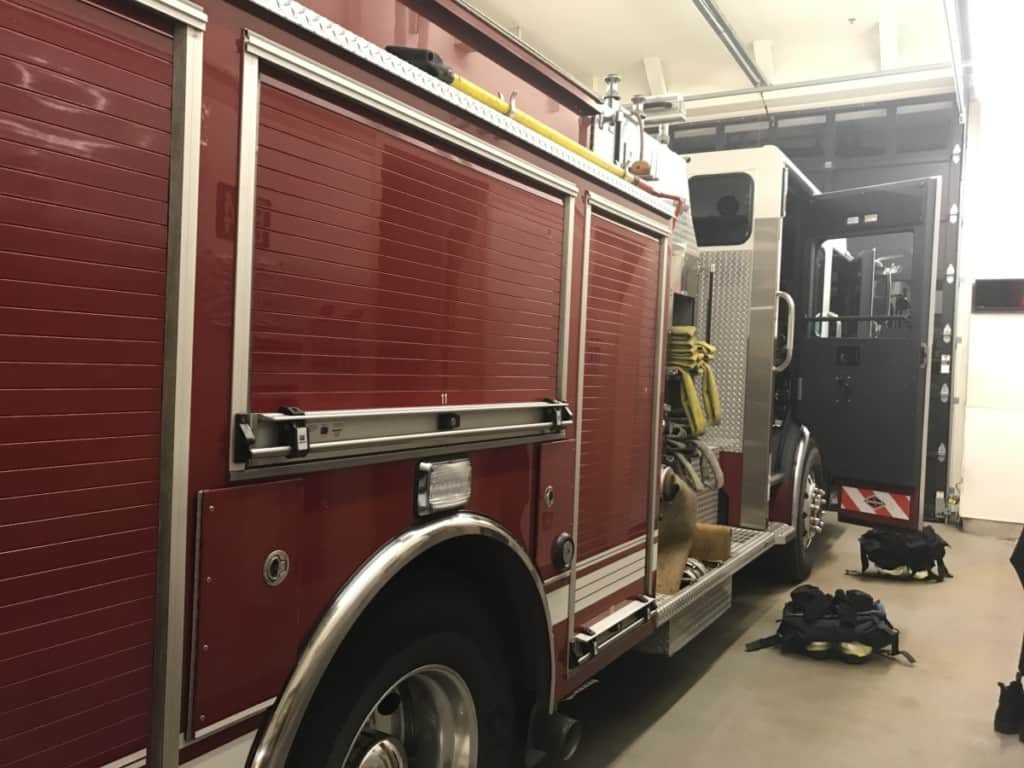Hopefully, you are never inside a burning building (unless you are a firefighter), but if you ever find yourself in a structure that is on fire, will opening the window help? This is a good question and the answer is not as straightforward as you may assume. So, is it a good idea to open a window during a fire?
Opening a window during a fire is not usually a good idea. This allows for increased oxygen to fuel the fire and can cause an increase in heat and the rate of fire spread. The only time it may be a good idea to open a window, is if that is the only way for you to safely escape the fire.
Lets take a look at what happens when a window is opened during a fire, why they are usually best kept closed and some reasons why firefighters will sometimes break windows while fighting a fire. Here’s what you need to know.
Your # 1 priority is keeping your family safe. As a firefighter, I recommend everyone has updated smoke detectors that don’t require battery changes, like these ones from Kidde, a fire extinguisher, like this one from Amerex, and a fire escape ladder if you have bedrooms above the first floor, I recommend this one from Hausse.
Also read: Why Do Firefighters Cut Holes In Roofs?
What Happens If You Open A Window During A Fire?

The problem is that you don’t know what will happen if you open a window during a fire.
This will depend if the fire is limited by its fuel or by the amount of oxygen it has available. (fuel controlled vs. ventilation controlled fires)
It might be nothing at all, you pop open the window and a gentle breeze enters the building and the person inside gets a little fresh air.
They might even be able to climb out of the window and make their escape (assuming they are at ground level – jumping out of upstairs windows is likely to cause as much or possibly more harm than the fire).
Note: If your only way out may be a window above the ground floor, getting a fire escape ladder and having it ready could be a life-saver. Check these out here on Amazon.
But these are best-case scenarios and there is no way to tell from the outward appearance of a blaze that this is what’s going to happen. In fact, it’s far more likely that you might cause the people inside the house major problems and in an instant too.
You see when you open a window, you provide a route for air to travel in and out of. Fires need oxygen to survive and continue burning. If the fire gets more oxygen from an open window, many times, this will cause an increase in fire activity.
If you are interested in how fires can change based on ventilation, here is a great video:
Why Should Windows Be Kept Closed During A Fire?
When you open a window in a fire, that new route for air to travel can be very dangerous, indeed.
Firstly, smoke can be attracted to the airflow and the room that the person is in may fill with thick, black smoke and quickly overwhelm them.
Smoke can be pulled under or around doors, so, even if the door is closed, this can be a possibility.
You may also encourage the fire to spread in the direction of the new flow of oxygen coming in through the open window. That means the fire is going to pull towards a room, potentially, that has people in it.
This is simply not a good idea. So, whenever possible, you want to keep windows closed until the fire department arrives.
Also read: How Long Does It Take To Put Out a House Fire?
When Can You Open A Window In A Fire?
If the smoke and flames are getting close and there is no way out of your home or building except via a window, then it’s time to take action.
In these instances, you want to close any doors into the room first. This will help to slow down any rush of smoke to the room if opening the window results in drawing smoke from the rest of the building and it will act as a temporary fire break.
Be aware though that a ground floor window may offer an excellent escape route to the outside, but windows on higher floors, typically, do not, unless there is some way for you to get to the ground safely (such as a fire escape ladder) or unless there’s a balcony you can stand on to wait for help to arrive.
Why Do Firefighters Break Windows?

Firefighters sometimes break the windows at a structure fire in order to better control and ventilate a fire.
Because they come prepared to extinguish the fire, as long as the individuals inside the building at the start of the fire are safe, they are able to smash the windows to reduce the amount of smoke in the building and to control the movement of fire.
Years ago, this was a very common practice to break most windows on a structure fire in order to ventilate the fire and increase visibility inside for firefighters. However, it is now usually only done in a much more coordinated fashion. This is due to scientific-based firefighting practices improving and allowing firefighters to progress to more effective tactics over the years.
However, this isn’t a risk-free process particularly if the building is full of toxic and/or flammable gas as a result of the fire.
An open window can trigger a “backdraft” that is when so much oxygen is sucked into the superheated environment, that it ignites the gasses in the smoke, and everything nearby explodes or catches fire at the same time.
As it sounds, this can be very dangerous and even a trained firefighter can die when they happen.
Other Things You Shouldn’t Do In A Fire
Here are some other things that you shouldn’t do in the event of a fire and they include:
- Don’t stop to collect things before leaving the building. People die because they stopped to pick up their wallets, their cats, or their valuables. If you have things that you can’t live without – keep them in a secure safe or fireproof box near the front door.
- Don’t open doors in the building, unless the handle is cool to touch and it is the only way for you to escape. As with opening windows, opening doors presents a risk in terms of ventilation and airflow.
- Don’t throw water on electrical fires or oil fires. This should be obvious but can get electrocuted by throwing water on an electrical fire. Oil fires might not be so obvious, but if you throw water on them, you’re going to spread the fire around rather than extinguish it. That’s a bad idea.
- Don’t try and take an elevator. In a building fire, one of the very first things to happen is that the electrical circuits become overloaded and then they stop working. If you are trapped inside an elevator, you have basically turned yourself into a pre-made roast. That’s why we put turkeys in metal pans in the oven, it cooks them all over. Don’t be a turkey.
- Don’t hide in closets or under your bed. This won’t provide much additional protection from smoke or fire, but it will make it much harder for firefighters to find you and then get you to safety.
- Don’t keep solvents or fuels in your buildings. Probably a bit late to deal with this once a fire breaks out, but if you want the fire to spread insanely quickly, then giving it access to highly flammable liquids will do the trick. Store them well away from your home and in a safe, secure cabinet.
- Don’t wait to call the fire department. Nobody will be angry with you if you call the fire department, then extinguish the fire yourself. The earlier you call, the easier it is for the fire service to save lives if things get out of hand. It is always better to be safe than sorry.
Conclusion
Should you open windows during a fire? In most circumstances, you don’t want to open the windows in a burning building because you may help to fuel the fire with oxygen and the new ventilation path may pull smoke and/or fire through the building.
However, if you find yourself trapped in a burning building and the only available exit is through a window, you should shut any doors between you and the fire prior to opening or breaking the window. Please note that breaking windows is often hazardous, and you may injure yourself severely on broken glass, this is an action of last resort, only. If you can wait for help, you would be better off doing so.
Related Articles:
Why And How Does Water Put Out Fire? Explained
House Fire Temperature: How Hot Does It Get?

